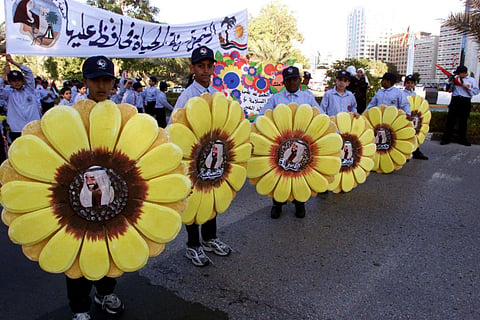UAE is on the right sustainability track
On National Environment Day, all residents must pledge to incorporate sustainable ways of living in their everyday lifestyle

Sustainable Consumption and Production (SCP) is one of the 17th agreed goals of 2030 Agenda of United Nations General Assembly (Sustainable Development Goals or SDGs) by all nations in September 2015.
On February 4 each year, UAE celebrates the National Environment Day. The main aim is to highlight the commitment of the UAE Government and other stakeholders towards preserving the environment and realising sustainable development. More importantly, it is an occasion to raise awareness about the importance of preserving natural resources and shifting towards a sustainable lifestyle.
The 21st UAE National Environment Day 2018, with the theme ‘Sustainable Consumption and Production (SCP)’, is a theme for a three-year-long initiative, SCP 2017-2019. This is a very vital theme to realise UAE’s Vision 2021 that focuses on improving environmental quality, increasing the contribution of clean energy and implementing green growth plans.
In fact, achieving Goal 12 on SCP of UN SDGs requires the SCP concept to be integrated into national and sectoral plans and strategies, sustainable business practices and consumer behaviour.
The UAE has a strong national framework for SCP and it is very clear that the SCP in UAE is moving in the right direction by means of policies, initiatives and measures to incorporate SCP into daily business and life activities. For instance, the UAE’s Green Growth Strategy underlines SCP.
A major challenge
The UAE leadership is fully aware and very keen on achieving sustainable development that does not harm the environment, current or future generations. For the UAE, the high consumption rates (of water, food, energy, etc) present a major challenge. However, changing behaviour and attitude are the most difficult of tasks and take quite some time to be achieved.
Thus, the three-year round for SCP is important to focus on changing shopping habits by buying products that are eco-friendly and help reduce individual’s carbon footprints — by using a car pool whenever possible, reusing products, recycling them, and reducing the use of plastic bags and products and so on. Only by changing to a responsible consumer habits, we, the citizens, can force the whole system of consumption and production to be sustainable.
In water and agriculture sectors, many initiatives have to be taken such as reforming of institutions and legal reform programmes to overcome the fragmentation of responsibilities in these sectors. There are other initiatives that include installing modern irrigation systems such as sprinkler, drip and fountain irrigation systems to replace flood irrigation method, which waste large quantities of water; recycling of treated sewage wastewater for various applications; cutting subsides for unsustainable agricultural means. Besides these efforts, there are other ways to ensure we attain sustainable objectives such as establishing ‘The food bank initiative in 2017’, which is a charitable organisation to collect excess food from hotels and restaurants for distribution among the needy.
The UAE has taken several initiatives for safe management of chemicals and wastes to establish the infrastructure for reducing and recycling all waste. The Strategic Agreement between Masdar and Beeah to develop the UAE’s waste-to-energy (WtE) sector is a case in point.
In fact, the most important initiatives are being undertaken in the transport and energy sectors. Dubai Metro and electric cars and buses are just a few examples in the transport sector. In energy sectors, many initiatives have been launched to promote sustainable and clean energy. These include: Applying slab tariff, banning import of inefficient incandescent light bulbs, implementing the green building code as well as launching Dubai Integrated Energy Strategy 2030 and deregulating fuel prices.
To support SCP, a creative policy mix (i.e. command-and-control measures, market-based instruments, awareness and education measures) needs to be developed to realise the shift to a sustainable lifestyle in the country.
Last but not least, SCP aims at encouraging new value-based growth by including more social and environmental considerations in the growth process. It must be pointed out that many of these values are already part of local cultures and religions. For example, unsustainable consumption goes against Islamic values. All types of extravagance are bad and even considered a sin in Islamic culture.
Realising SCP will enhance the UAE’s image even further, advance the quality of life, achieve sustainable development and attract more tourists and investments to the country.
Dr Mohamed Abdel Raouf is an independent environment researcher.



